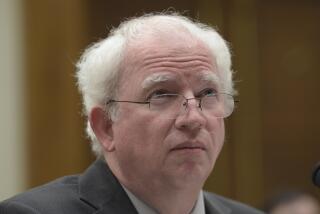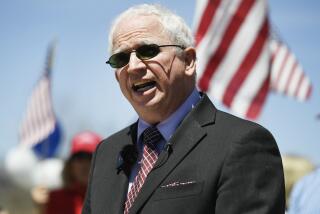Judge in Whitworth Spy Trial OKs Use of Disputed Letters
- Share via
SAN FRANCISCO — A federal judge granted a government request Tuesday to allow introduction of highly incriminating letters described as “virtual confessions” in the spy trial of ex-Navy sailor Jerry Whitworth.
The four letters, mailed anonymously to the FBI in 1984, were signed only “RUS,” and offered to disclose a longtime Soviet spy ring in exchange for immunity from prosecution.
Their use in Whitworth’s coming trial will greatly bolster the government’s planned testimony from confessed spy John A. Walker of Norfolk, Va., a key witness against Whitworth.
Rejects Argument
In Tuesday’s ruling, U.S. District Judge John P. Vukasin, who has previously refused to admit the “RUS” letters, rejected a defense argument that they would “unfairly prejudice” the jury against Whitworth.
By allowing the letters as evidence, the judge gave the government the opportunity to try to prove that Whitworth wrote them. It will be up to the jury to decide the answer to that crucial question.
Whitworth, 46, a retired Navy radioman from Davis, has been named by the government as the alleged West Coast link to the espionage ring operated by Walker.
Defense lawyer James Larson argued that the government has not produced hard evidence that Whitworth wrote the letters.
The letters are considered a major piece of incriminating evidence against Whitworth. They were written by someone claiming to be a member of a longtime Soviet spy ring who would tell all to the FBI in exchange for immunity from prosecution.
Larson had argued that the letters amount to “virtual confessions to spying,” even though it cannot be conclusively shown that Whitworth wrote them.
Vukasin wrote that although the court had called the letters “in essence . . . a confession,” the primary purpose of “RUS” was “to divest himself of certain information in exchange for the protection of his identity and complete immunity for prosecution.”
“The ultimate purpose of the letters, then, was not confessional,” Vukasin said. “Rather they may be viewed as the opening bid in a game” which “RUS” eventually concluded was not worth playing.
Vukasin said he did not base his decision on a writing-style analysis that linked Whitworth to the letters. Writing-style analysis has not been accepted in federal courts as a scientific method of identifying people.
The government argued that Whitworth must have written the letters partly because of postmarks from Sacramento, 20 miles from his Davis home, and because of similarities in punctuation, spelling and style used by both “RUS” and Whitworth.
Prosecutors contend that the letters provide “the strongest and only direct evidence” linking Whitworth to knowledge that the information he was passing to Walker was going to the Soviets.
Began in May, 1984
The letters were first sent to the FBI in May, 1984. Three months later they stopped just as abruptly as they began.
Opening statements in the jury trial are set to begin March 24. Whitworth is named in a 13-count indictment charging him with espionage, conspiracy and tax fraud.
The government contends that Whitworth was paid $332,000 for information he passed to Walker.
More to Read
Sign up for Essential California
The most important California stories and recommendations in your inbox every morning.
You may occasionally receive promotional content from the Los Angeles Times.













